Related Research Articles
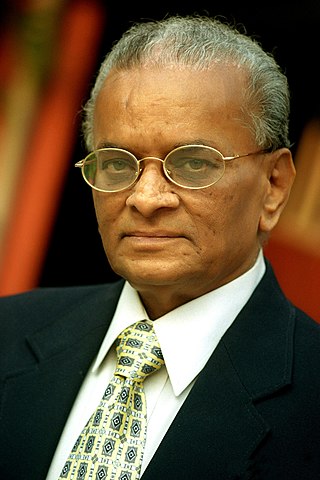
Chandrakant Keshavlal Bakshi was an Indian Gujarati-language author from Gujarat, India and a former Sheriff of Mumbai. He was known for his bold and new concepts in writing during his time in Gujarati literature. He is also addressed as Bakshi or Bakshibabu. Born in Palanpur, he completed higher education and had a business in Calcutta. He started writing there and later moved to Mumbai for his teaching career. He wrote 178 books, and wrote extensively in newspaper columns.

Niranjan Narhari Bhagat was an Indian Gujarati language poet and commentator who won the 1999 Sahitya Akademi Award for Gujarati language for his critical work Gujarati Sahiyta – Purvardha Uttarardha. He was also an English poet, and had written over a hundred poems in English, most being written in the style of Gitanjali.
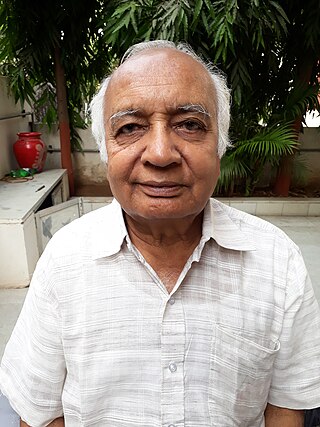
Shirish Jagjivandas Panchal is a Gujarati critic, fiction writer, translator and editor. He won the 2009 Sahitya Akademi Award for Gujarati language for his criticism Vaat Aapanaa Vivechan-ni. He refused the award.
Swami Anand was a monk, a Gandhian activist and a Gujarati writer from India. He was the manager of Gandhi's publications such as Navajivan and Young India and inspired Gandhi to write his autobiography, The Story of My Experiments with Truth. He wrote sketches, memoir, biographies, philosophy, travelogues and translated some works.
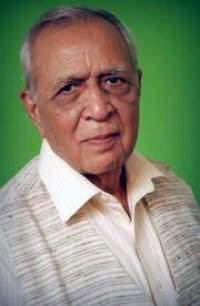
Bholabhai Patel was an Indian Gujarati author. He taught numerous languages at Gujarat University and did comparative studies of literature in different languages. He translated extensively and wrote essays and travelogues. He was awarded the Padma Shri in 2008.

Sitanshu Yashaschandra Mehta, better known as Sitanshu Yashaschandra, is a Gujarati language poet, playwright, translator and academic from India.

Chandrakant Amritlal Topiwala is a Gujarati language poet and critic from Gujarat, India.
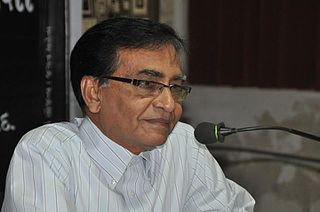
Suman Shah is a Gujarati language critic, short story writer, novelist, essayist, editor and translator from Gujarat, India. He won the Sahitya Akademi Award in 2008 for his short story collection Fatfatiyun. He has written both in the modern and in the postmodern eras in Gujarati literature. He has authored more than 74 books, including 2 novels, 6 short story collections, 4 collections of creative essays, 6 translations into Gujarati from English and Hindi, 22 books on literary criticism and around 23 edited works of literary theory and modern Gujarati short stories and poems. He was honorary editor of Shabdasrishti from 1983 to 1986 and an editor of Khevna, a literary journal, from 1987 to 2009.
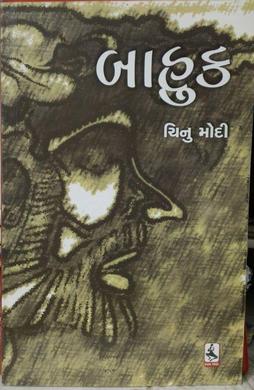
Bahuk is a Gujarati long narrative poem by Chinu Modi. The poem is composed both in metrical and non-metrical verse and centres on Nala, a character from the Mahabharata who metamorphosed into Bahuka. It is an acclaimed poem of Gujarati literature written in Sanskrit-styled figurative language. The poem was selected for the Ushnas Prize (1982–83) by the Gujarati Sahitya Parishad.
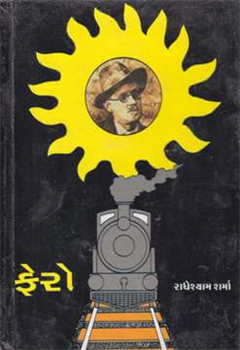
Fero is a Gujarati novel written by Radheshyam Sharma. It was published in 1968 by Rekha Prakashan in Ahmedabad. It is acclaimed in Gujarati literature for its experimental nature and is considered a literary milestone among modern Gujarati authors. It was followed by Sharma's similarly exploratory novel, Swapnatirtha.
Chandrakant Nureti is a given name. Notable people with the name include:

Chhinnapatra is a 1965 Gujarati novel by Suresh Joshi. The novel is composed in the form of letters written by protagonist Ajay, a creative writer. Considered to be a lyrical novel, it uses stream of consciousness technique.

Ramnarayan Vishwanath Pathak was a Gujarati poet and writer from India. Profoundly influenced by Gandhian thought, Pathak wrote criticism, poetry, drama, metrics and short stories. He edited and translated literary works. He was appointed the president of Gujarati Sahitya Parishad in 1946. He was awarded the Gujarati literary prizes Narmad Suvarna Chandrak for Prachin Gujarati Chhando in 1949 and Sahitya Akademi Award for Bruhat Pingal in 1956.

Diwan Bahadur Krishnalal Mohanlal Jhaveri was an Indian writer, scholar, literary historian, translator, and judge from what is now Gujarat, India. His works have been published in Gujarati, English, and Persian. Jhaveri served as president of the Gujarati Sahitya Parishad from 1931 to 1933.

Atmavrittanta, formally published as Manilal Nabhubhai Dwivedinu Atmavrittanta, is an autobiography written by Gujarati writer Manilal Nabhubhai Dwivedi (1858–1898). Its publication was prevented for many years by Manilal's family and friends because it contains explicit details of his extramarital relations and controversial views on morality.

Manoj Sakarchand Shah is an Indian theatre director, actor and producer known for his works in the Gujarati theatre. He has directed over 90 plays, such as one-man plays and biographical plays, in different genres. He is known primarily for his quirky biographical plays which include: Hu Chandrakant Bakshi based on the writer of the same name, Mohan No Masalo based on Mahatma Gandhi, Apurva Avsar based on Jain mystic Shrimad Rajchandra, Mareez based on poet Mareez, Jal Jal Mare Patang based on writer-philosopher Manilal Dwivedi, Karl Marx in Kalbadevi based on German philosopher Karl Marx, and Dr. Anandibai Joshi: Like, Comment, Share based on Anandi Gopal Joshi, India's first female doctor. He produces plays under his theatre company Ideas Unlimited.

Arvachin Kavita is a 1946 critical work by Gujarati writer, poet and critic Tribhuvandas Luhar, pen-name 'Sundaram'. The book offers a historical and critical survey of modern Gujarati poetry from 1845 to 1945.
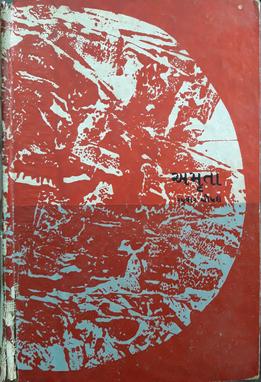
Amrita, also spelled Amruta, is a 1965 Gujarati novel by Raghuveer Chaudhari. Although criticized for its highly Sanskritised language and lengthy metaphysical discussion, it is regarded as a landmark in the development of the experimental novel in modern Gujarati literature. It has been referred to as a reflective existentialist novel.

Govardhanram: Chintak ne Sarjak, which was written by Indian writer Vishnuprasad Trivedi, is a 1962 Gujarati critical text about Gujarati writer Govardhanram Tripathi. It is considered an important work on Govardhanram.
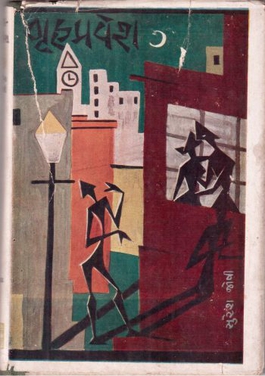
Grihapravesh is a 1957 collection of short stories by Indian writer Suresh Joshi, written in Gujarati. The collection gave rise to a new form of short story writing in Gujarati literature, favouring language over plot.
References
- 1 2 Mehta, Candrakanta (2005). Indian Classics – Gujarati. Translated by Maru, Pallavi. New Delhi: Publications Division, Ministry of Information and Broadcasting, Govt. of India. p. 94. ISBN 978-81-230-1120-2.
- ↑ "The Humanities Review". 3. 1981. OCLC 6189687.
{{cite journal}}: Cite journal requires|journal=(help) - 1 2 3 Topiwala, Chandrakant (1997). "Paralysis". In George, K. M. (ed.). Masterpieces of Indian literature. Vol. 1. New Delhi: National Book Trust. pp. 335–336. ISBN 81-237-1978-7. Archived from the original on 2016-12-21. Retrieved 2020-01-02.